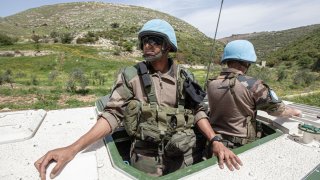Israel Shouldn’t Suffer from the UN’s Failure in Lebanon
Had UNIFIL carried out its mandate, many, if not most, of Israeli operations in Lebanon would not be necessary.
Israel revealed earlier this month that its troops had uncovered Hezbollah preparations for an October 7-style invasion and massacre in Israel’s northern communities. The Iran-backed terror organization has spent years building the infrastructure necessary to carry out such an attack under the nose of the United Nations Interim Force in Lebanon (UNIFIL), the peacekeeping force in southern Lebanon.
Having failed to prevent Hezbollah from establishing military capabilities on Israel’s border, the 10,000-strong force is now complaining that it’s caught in the crossfire as the Israel Defense Forces (IDF) attempt to defang the terror organization.
In recent weeks, the IDF has stepped up its operations in Lebanon with the primary goal of safely returning the over 60,000 Israelis displaced from their homes in northern Israel by Hezbollah’s missile barrages. During its operations in southern Lebanon, the IDF has discovered a network of terror tunnels, Hezbollah weapons caches, and evidence of Hezbollah’s plans to invade the Jewish state.
Despite UNIFIL’s mandate to prevent Hezbollah from militarizing southern Lebanon, the IDF has identified multiple locations where terror infrastructure has been established in close proximity to UNIFIL installations. In one recent incident, after a UNIFIL post was struck in southern Lebanon, injuring two UNIFIL personnel, the IDF carefully explained that its troops had identified an “immediate threat” approximately fifty meters away from the post, spurring them to respond with fire. The IDF then clarified that it had already instructed UNIFIL personnel to move to protected spaces, but they had failed to comply. Earlier this month, the IDF requested that UNIFIL evacuate its posts to avoid the fighting; UNIFIL refused.
Despite the IDF’s efforts, the foreign ministers of France, Germany, Italy, and the United Kingdom released a statement falsely accusing Israel of targeting UNIFIL positions. That slander has been articulated by, among others, UN secretary-general Antonio Guterres and Irish President Michael Higgins—who, over the last year, has repeatedly demonstrated that he’s never met an anti-Israel conspiracy theory he didn’t like.
These claims neatly fit the narrative prevailing in Europe, the Middle East, and much of the media coverage that the Israelis are conducting a scorched-earth campaign in Lebanon in which no one is safe. Lost in all this noise is the simple fact that it’s UNIFIL’s job to keep Hezbollah out of South Lebanon. Instead, Hezbollah has emerged as one of the most well-armed paramilitaries in the world.
We’ve seen this pattern before in other UN peacekeeping operations, where peacekeepers become accessories to the escalation of military conflict and the gross human rights abuses that inevitably follow. During the Bosnian War in 1995, Dutch UN peacekeepers acceded to the conquest of the town of Srebrenica by Serb forces, leading to the massacre of 8,000 Bosnian Muslim men and boys. The previous year, the UN mission in Rwanda merely stood by as Hutu militias launched a genocide that claimed more than 800,000 lives.
One can reasonably conclude that had Hezbollah succeeded in using south Lebanon as a launch pad for an October 7-style assault on northern Israel, UNIFIL would have observed everything and done nothing.
Had UNIFIL carried out its mandate, many, if not most, of these Israeli operations would not have been necessary. However, like the conflicts in Bosnia, Rwanda, and Somalia, the presence of UN peacekeepers in Lebanon has provided belligerent actors with an opportunity to increase and extend the fighting with much-needed political cover.
Israel rightly calculates that dealing with international opprobrium is preferable to suffering massacres in the presence of the UN.
It didn’t need to be this way. Since its establishment, UNIFIL has increased its manpower fivefold. Today, UNIFIL employs over 10,000 military personnel supporting the U.S.-backed Lebanese Armed Forces—which number more than 80,000 troops—and has an annual budget of over $550 million, of which the United States contributes $143 million. Hezbollah should have never been permitted to become the force it is today, albeit significantly degraded by the IDF in recent weeks. Moreover, UNIFIL is mandated to use force “to ensure that its area of operations is not utilized for hostile activities.” For nearly two decades, it has consistently failed to do so.
UNIFIL is not Israel’s target. Rather than allow UN peacekeepers to be used as human shields by Hezbollah, the UN Security Council should now instruct the force to cooperate with the Israelis to ensure that UNIFIL casualties are kept to an absolute minimum. Practically, that means ensuring that UNIFIL staff follow IDF guidance and maintain a safe distance from the battle zones so that the Security Council mandates systematically violated by Hezbollah can finally be enforced. If UNIFIL doesn’t play ball, then we are forced to question the purpose of its continued existence.
Enia Krivine is the senior director of the Israel Program and the National Security Network at the Foundation for Defense of Democracies (FDD). Follow her on X: @EKrivine.
Ben Cohen is a senior analyst with FDD. Follow him on X: @BenCohenOpinion.
FDD is a Washington, DC-based, nonpartisan research institute focusing on national security and foreign policy.
Image: Sebastien Castelier / Shutterstock.com.

